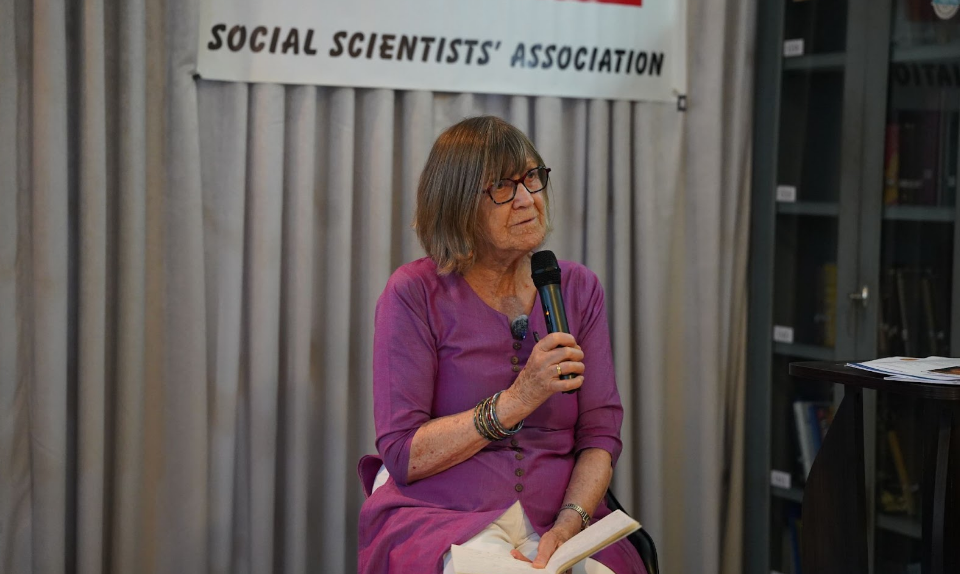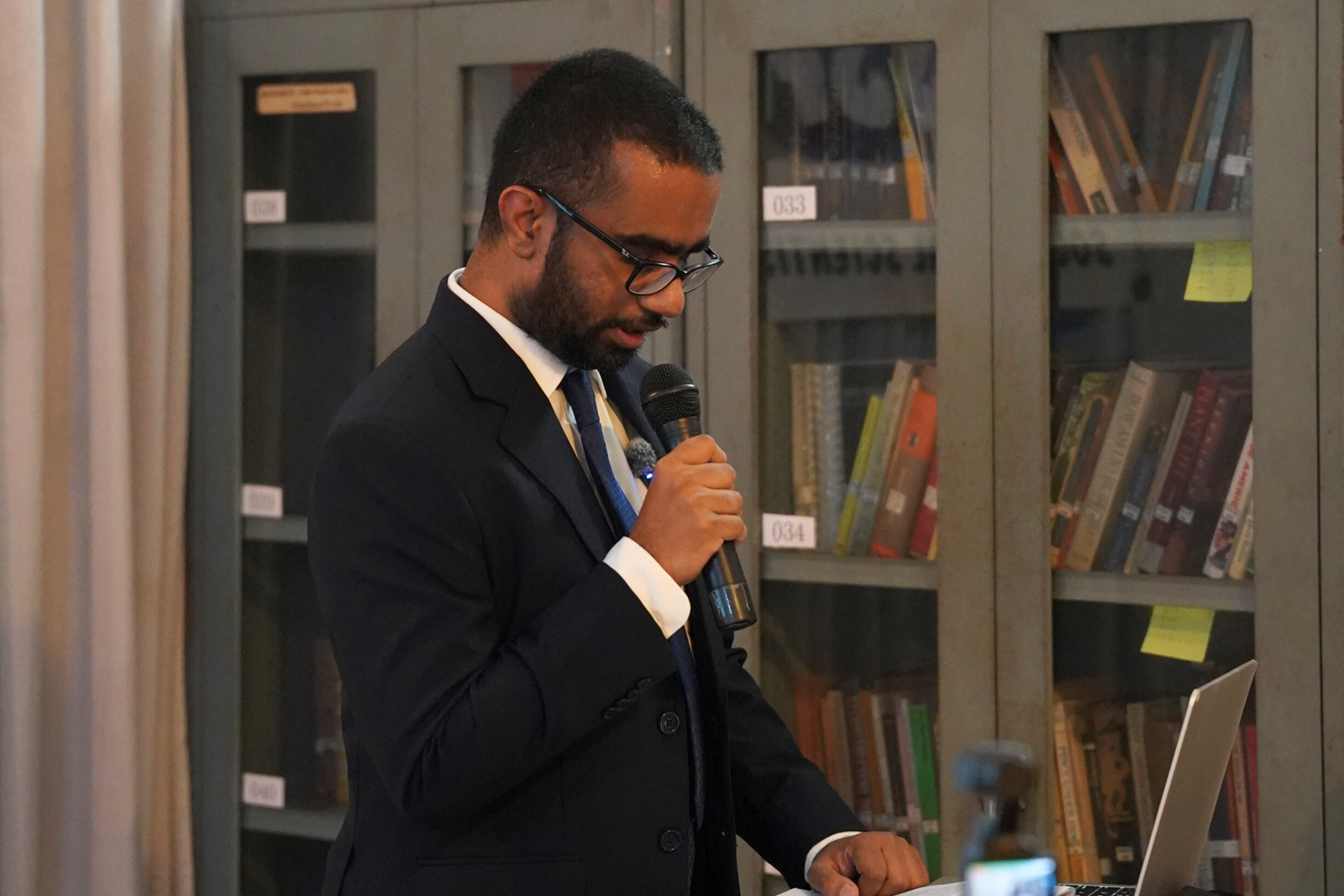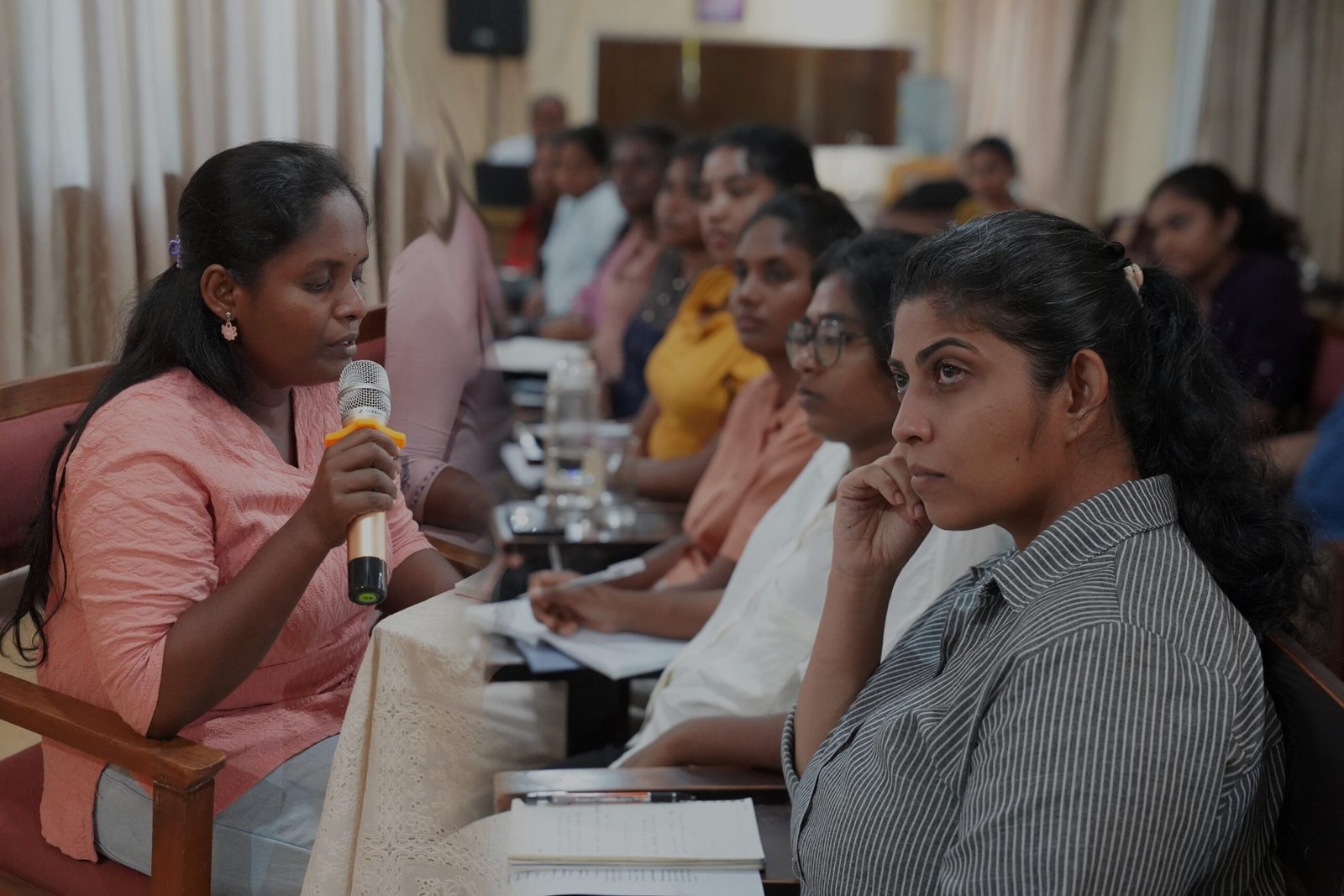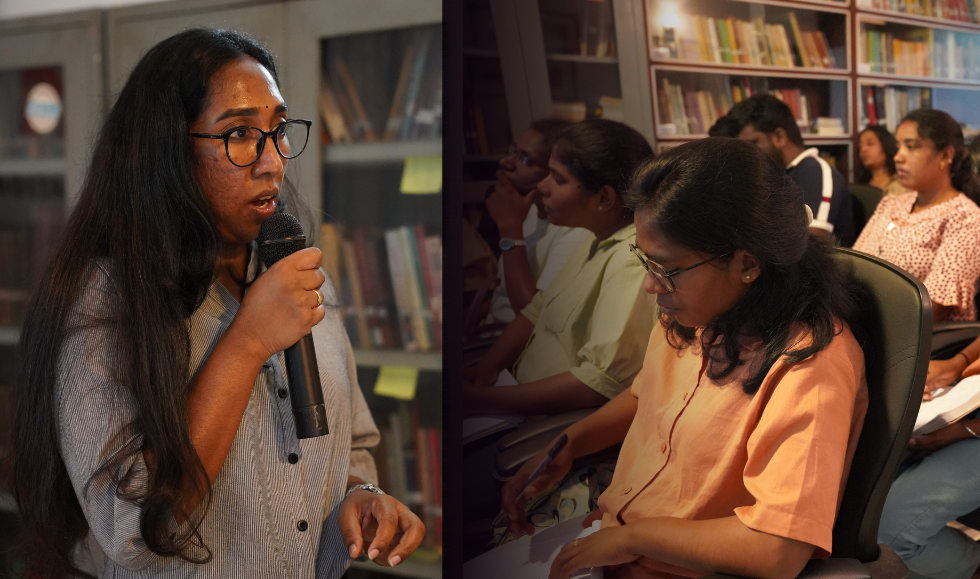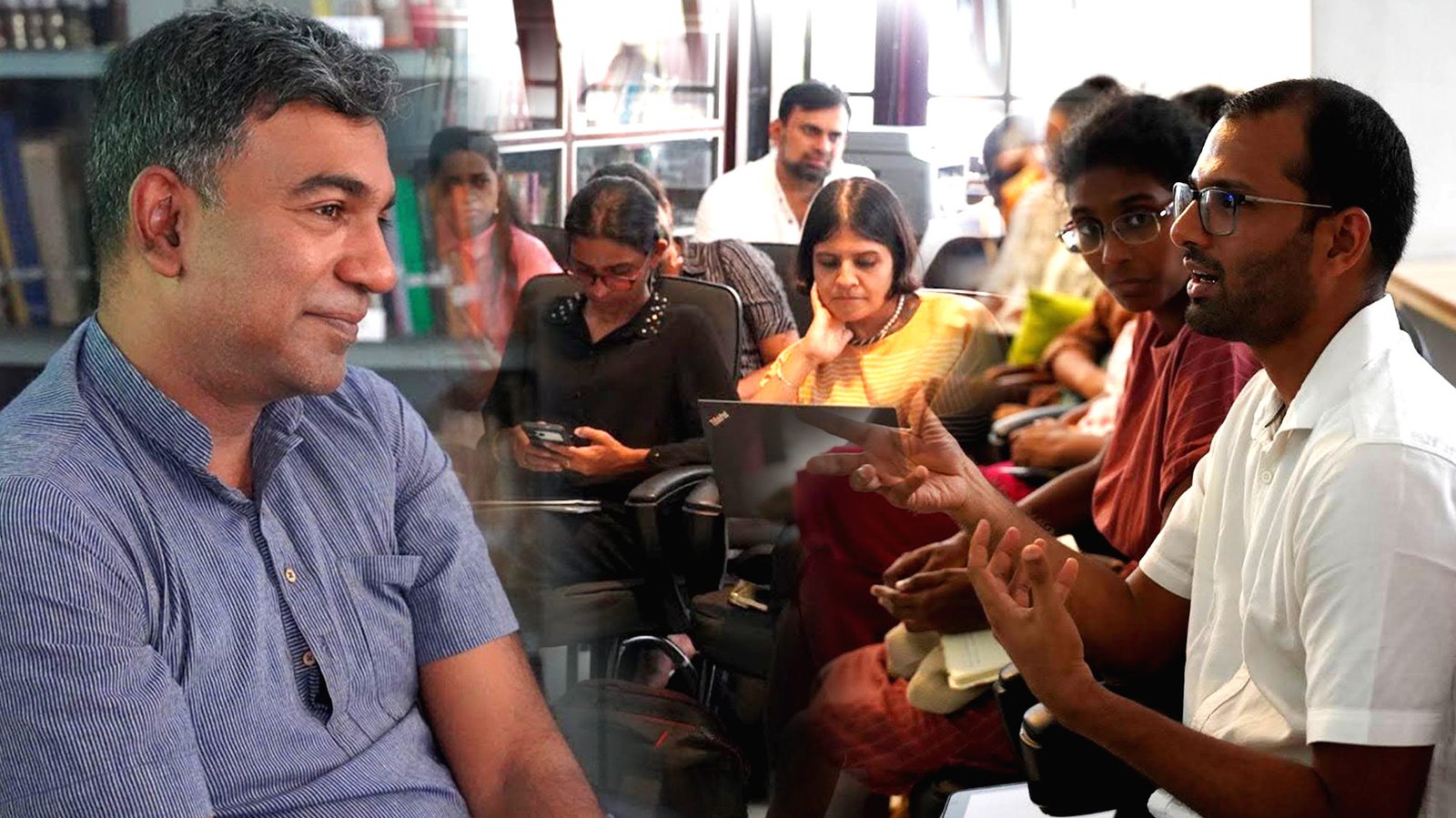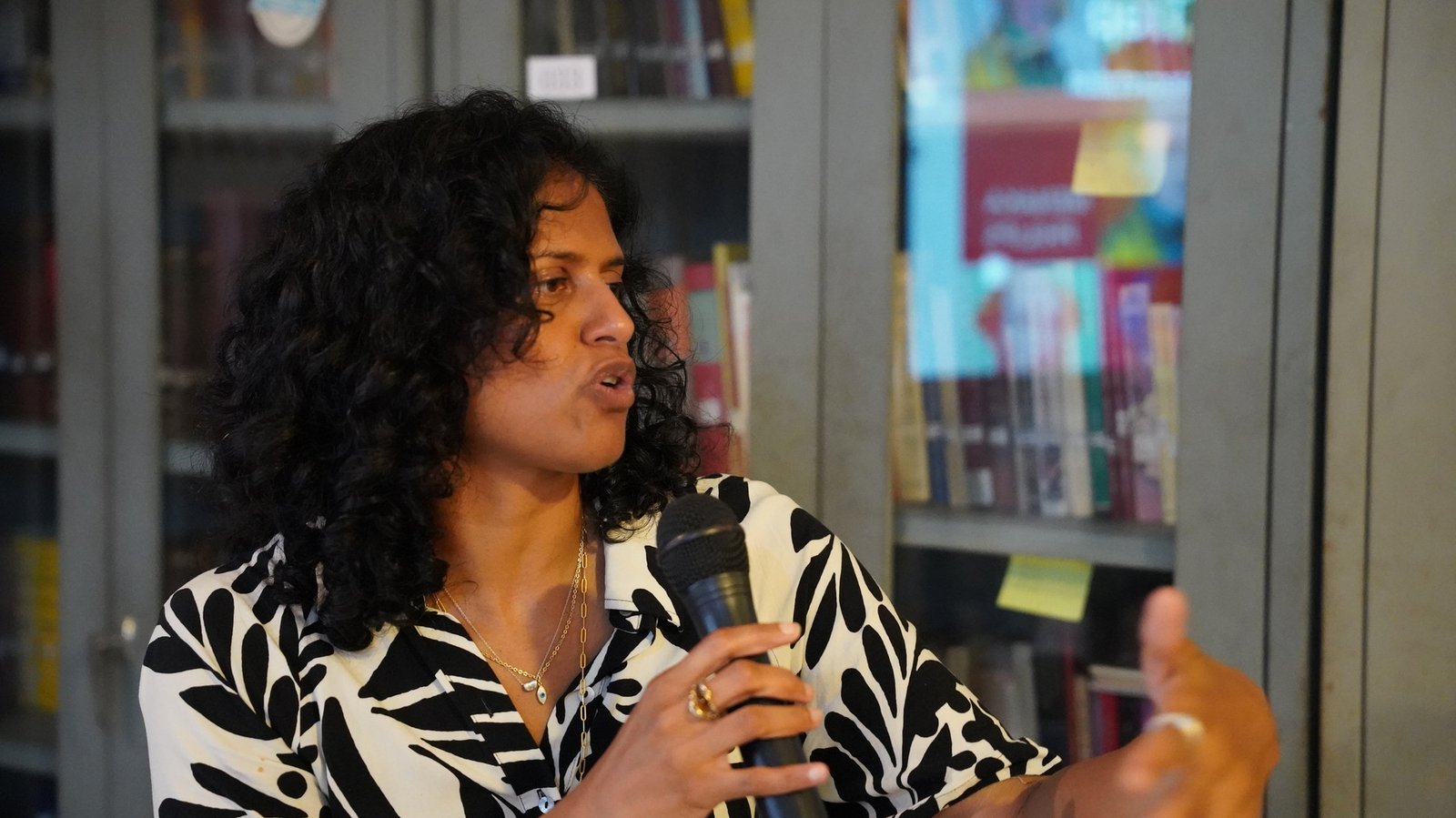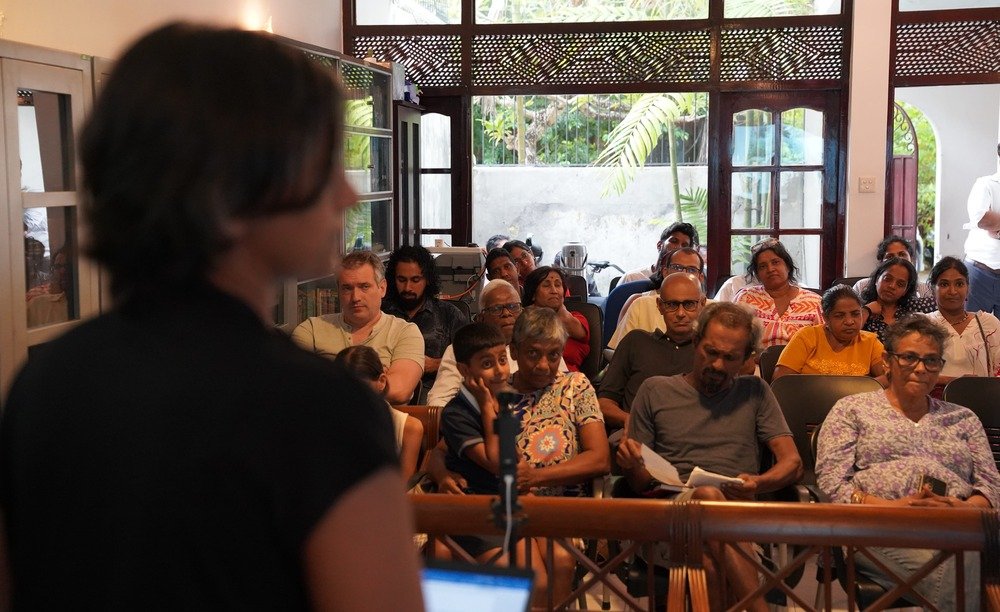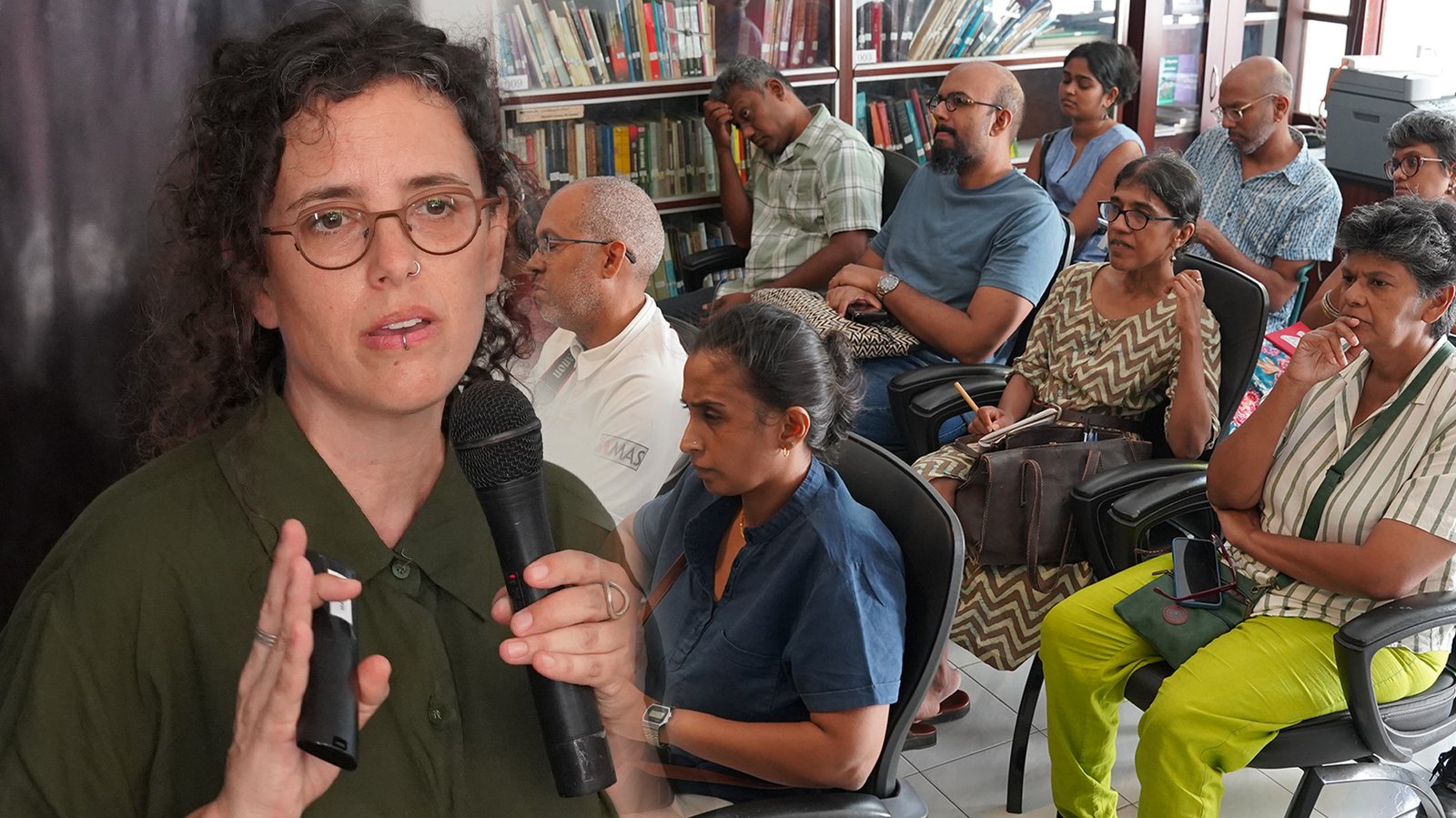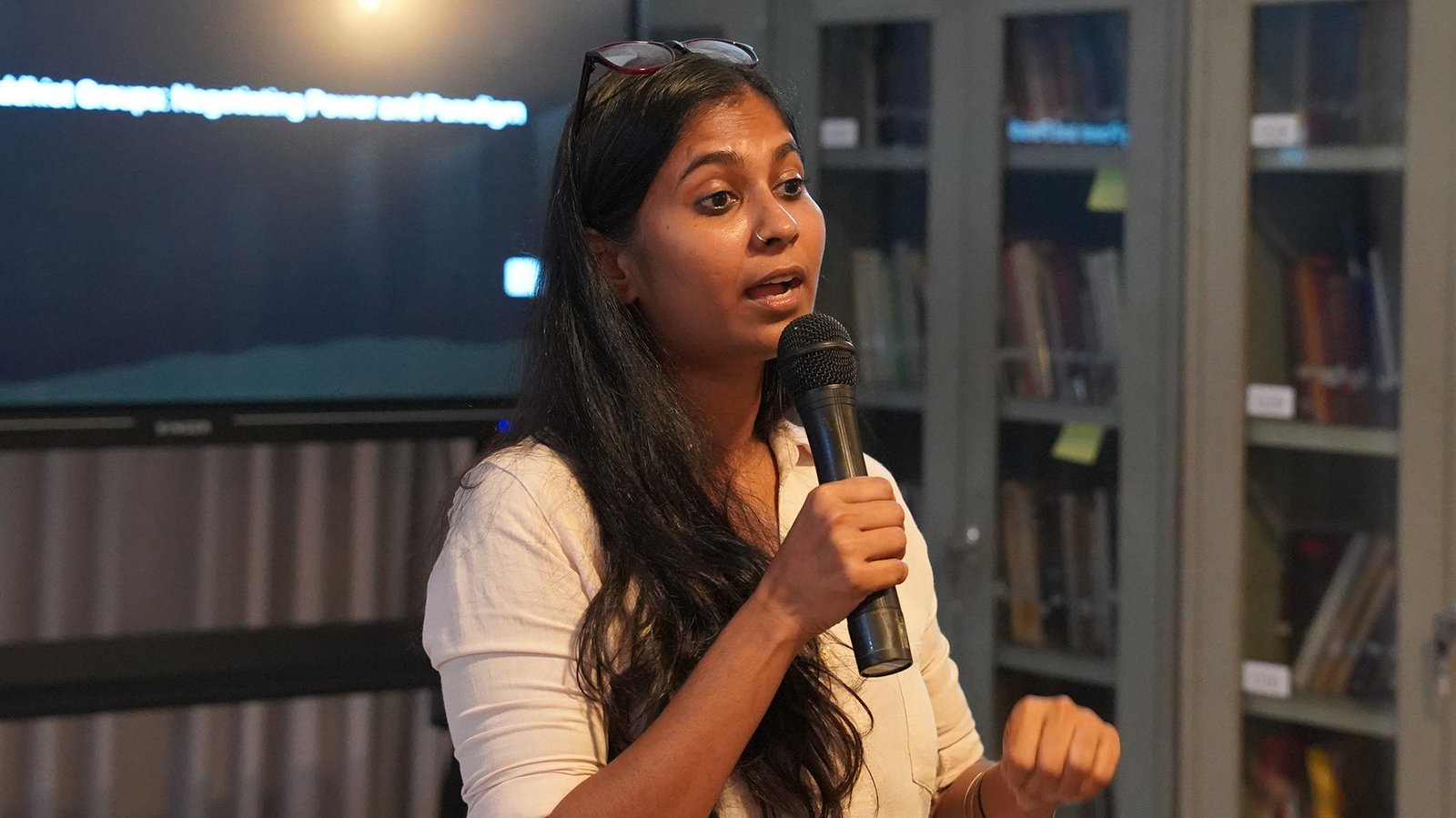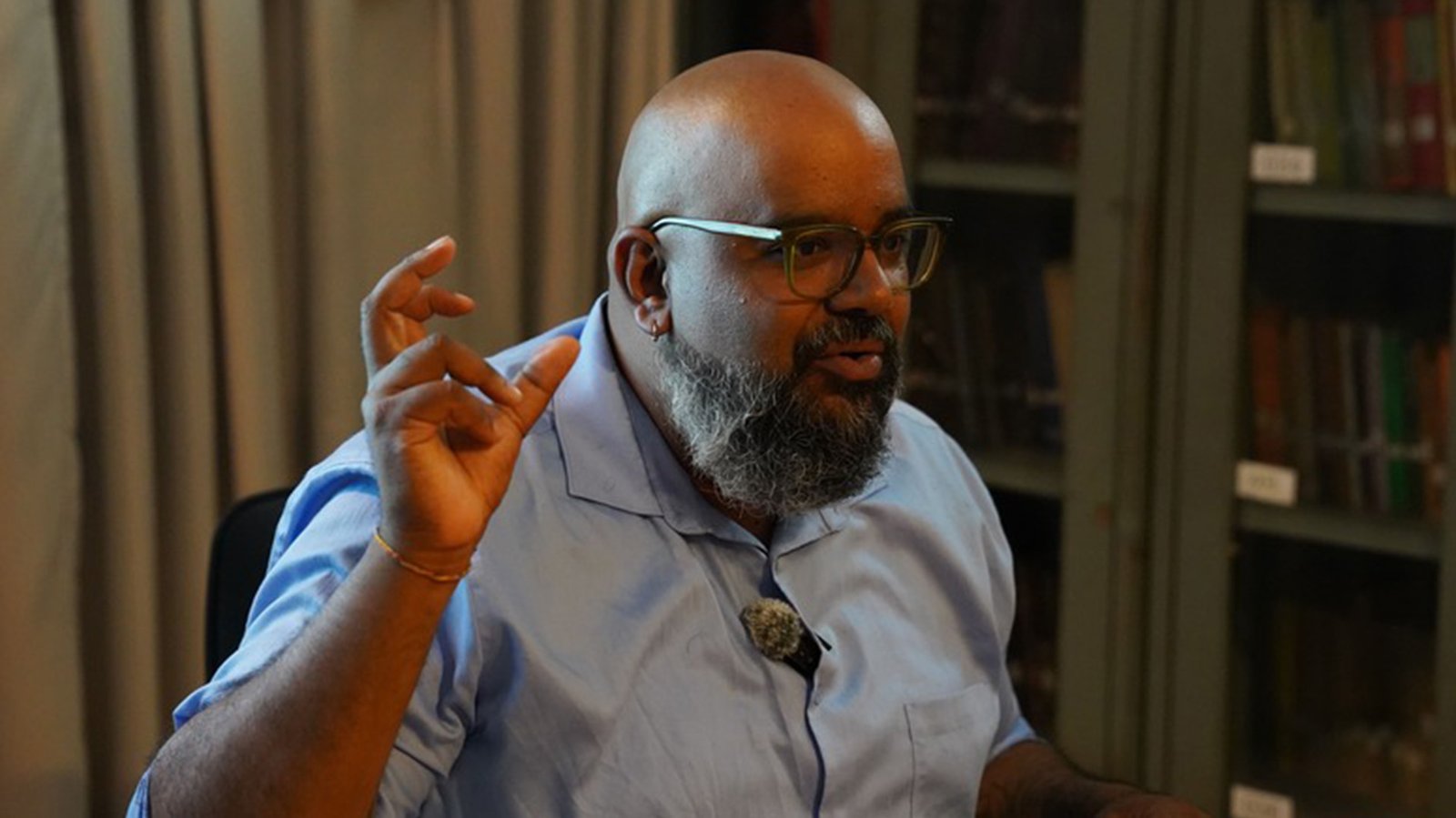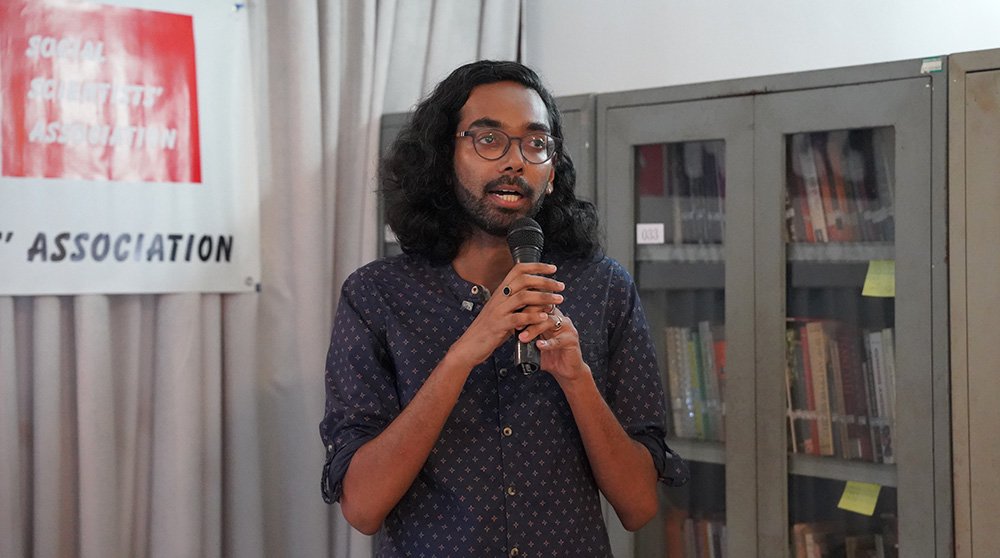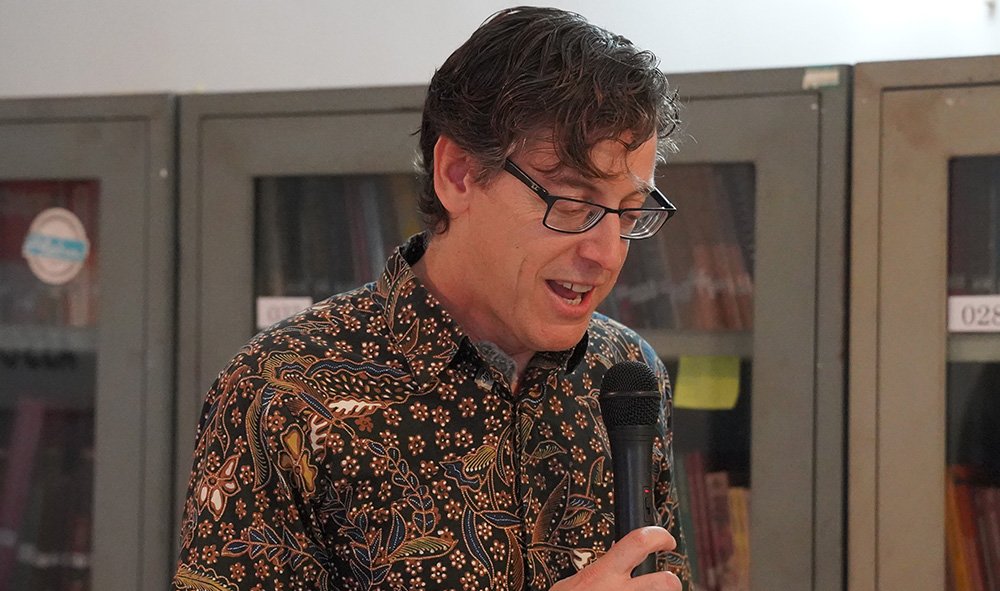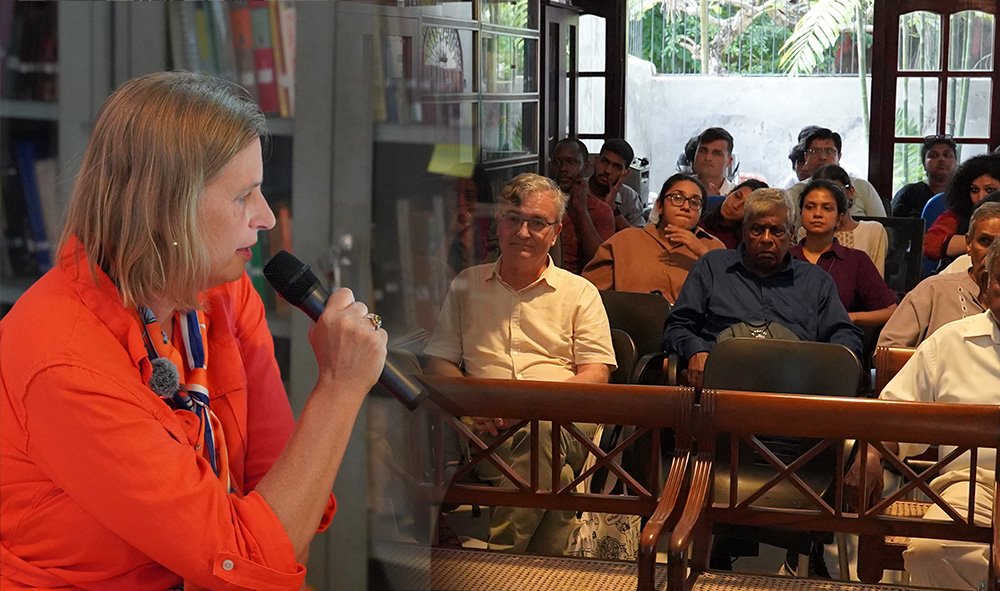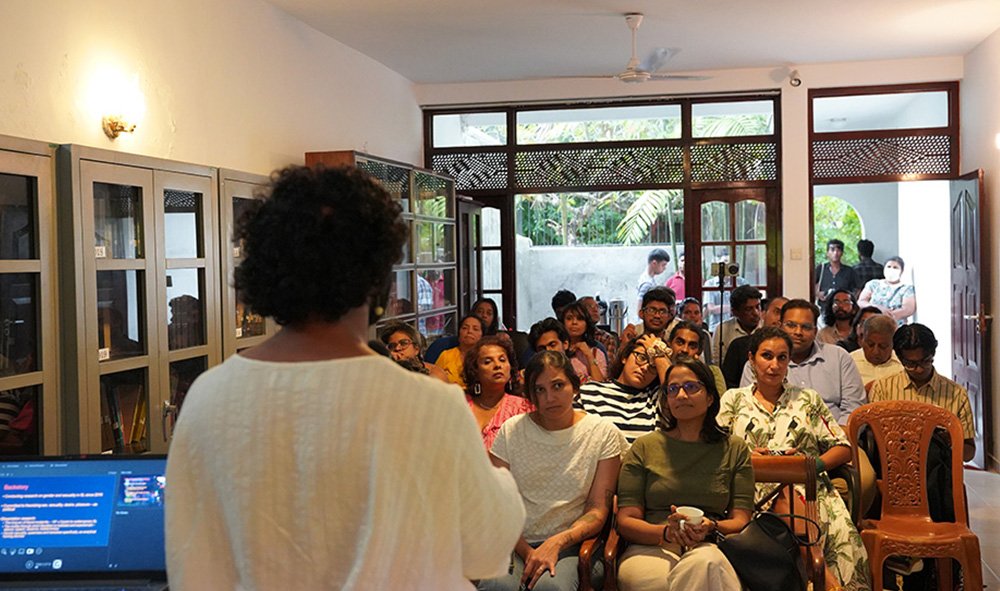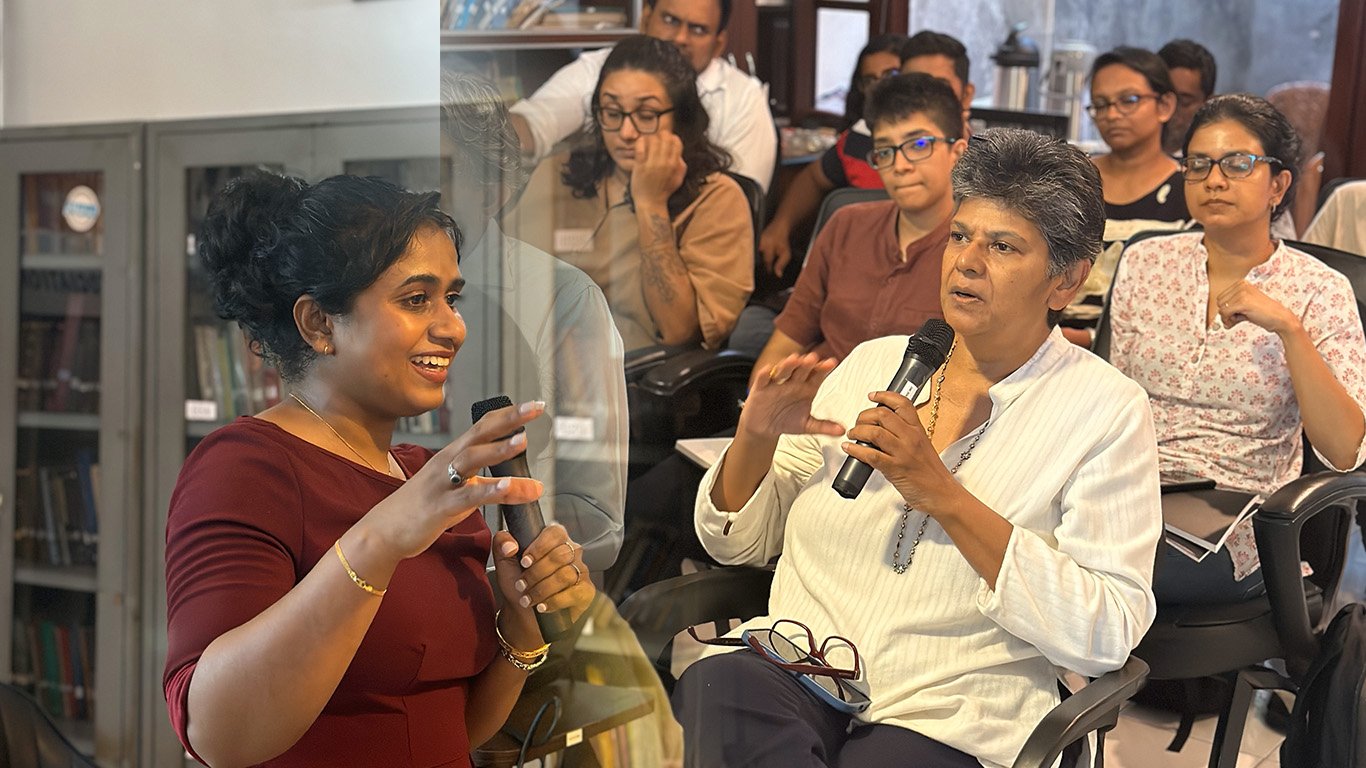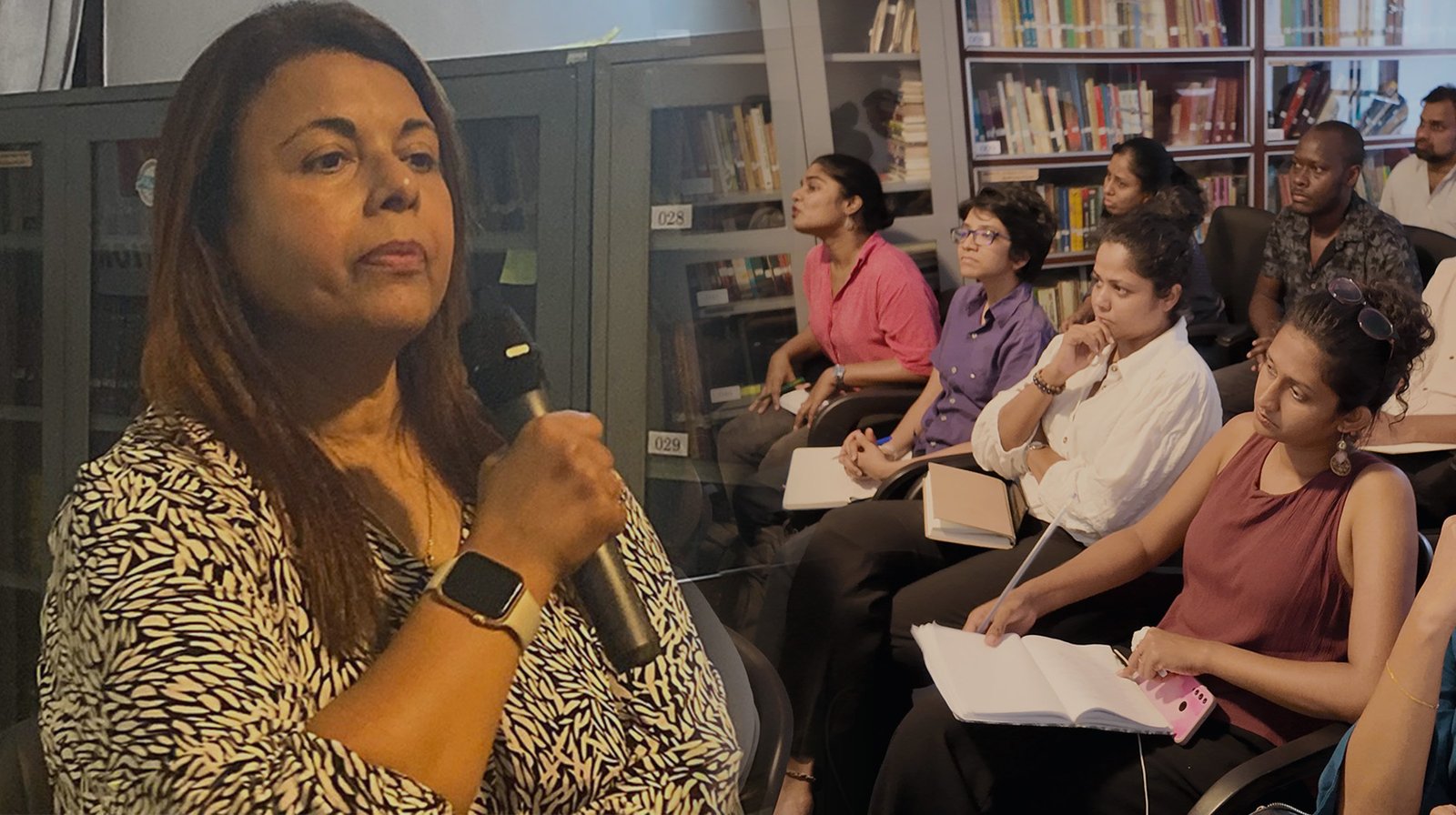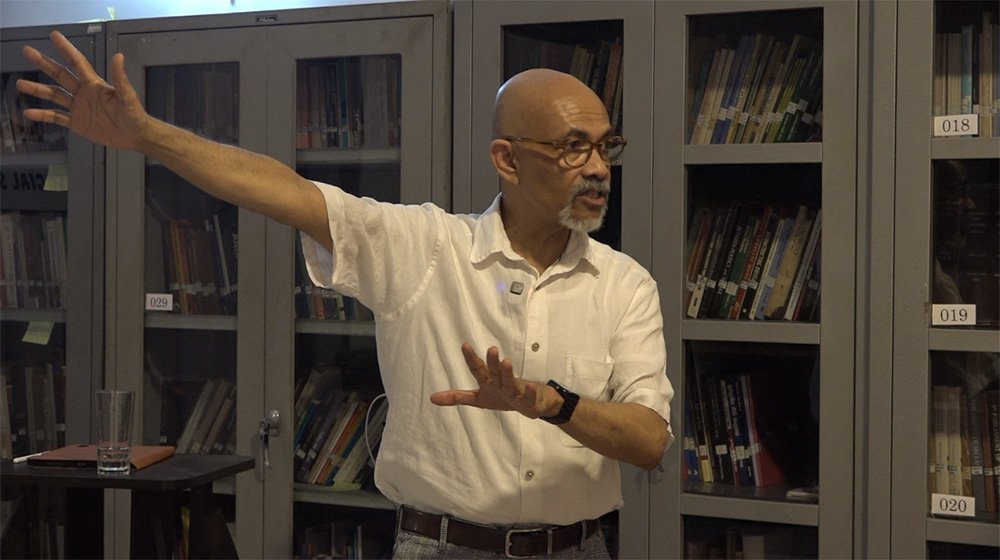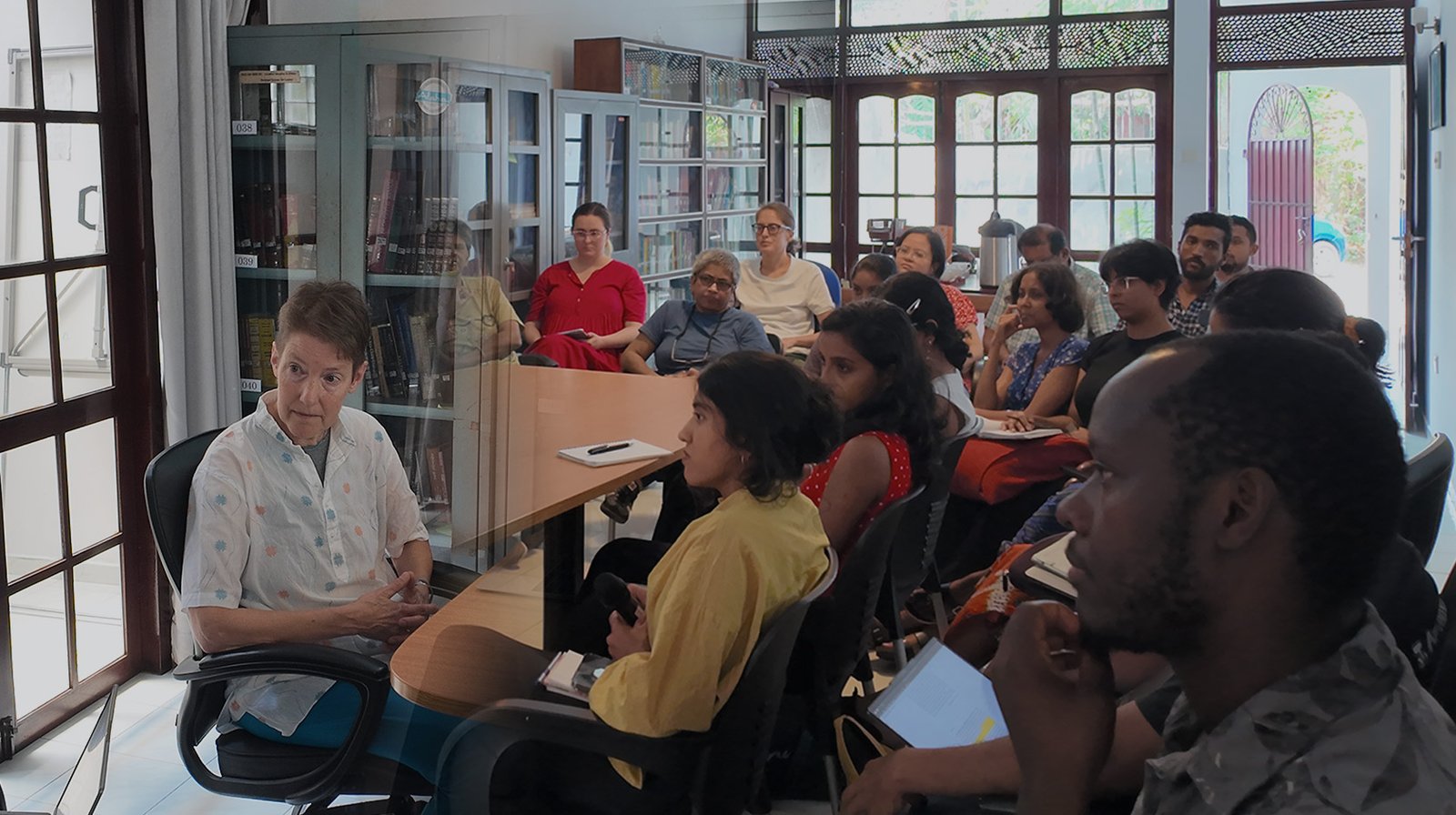Events
Religion, Space and Conflict in Sri Lanka: colonial and postcolonial contexts – a reflection and review
Elizabeth Harris
Dr Elizabeth Harris (Birmingham University) led a review and reflection on the contemporary relevance of her 2018 book, ‘Religion, Space and Conflict in Sri Lanka: Colonial and Postcolonial Contexts’, at the SSA in Colombo on 28 January 2026. Harris focused on the post-war project of Sinhala Buddhicisation of archaeological and other sites in the north and east, contextualising it in the western Christian missionary exclusivism of the 19th century in relation to Buddhism. Drawing on archival research and interviews, Harris raised questions on the connections between human imaginaries of the Self and the Other, in their influence on multi-religious, multi-ethnic, and sometimes syncretic, spatial landscapes Sri Lanka
Martin Wickramasinghe and the Politics of Culture
Uditha Devapriya
On the 10th of December 2025, the Social Scientists’ Association in collaboration with the Martin Wickramasinghe Trust hosted a discussion with Uditha Devapriya on his forthcoming book project into the writings of Martin Wickramasinghe. Devapriya explores the rich complexity that encapsulates Wickramasinghe’s works tracing the diverse influences that shaped his thinking and attempts to provide a holistic view of the social and intellectual contexts in which he wrote. Devapriya uses excerpts of writing either by Wickramasinghe himself or commentary about him to punctuate his analysis with moments that illustrate the ambiguities of both the writer and their environment in early to mid twentieth century Sri Lanka. Wickramasinghe’s writings span a wide range of thought, and although they are often associated with nationalist ideologies, his own work consistently reveals a critical stance toward chauvinism, romantic nationalism, and the conservatism of the Buddhist clergy.
Agrarian Studies Workshop 2025
Feminist political economy, labour and agrarian change was the theme of the 3rd annual workshop on agrarian studies in Sri Lanka between 31 October and 02 November 2025. Organised by the Young Researchers’ Network (YRN) in collaboration with the Social Scientists’ Association (SSA) and Law & Society Trust (LST), and with the support of the International Development Economics Associates (IDEAs). A plenary discussion on Women, Work, and the Weight of Crisis opened day one of the workshop. Day 2 featured findings on women’s labor force participation, workers in rubber/garment industries, household debt on low-income women, & rural land/credit access in Northern Sri Lanka. These were interspersed with reading group discussions on two texts dealing with the gendered division of labour in contemporary agrarian society and a classic study on the working and living conditions of women rubber tappers in Sri Lanka. The final day focused on discussion on follow-up from the workshop, including starting a study group on labour in agrarian change & a webinar series on food systems. It was agreed to develop common demands for people’s organisations to raise with state & government authorities.
‘Gendered Labour, Health Injustice, and Agrarian Dispossession in Sri Lanka’s Tea Plantations’
Thilageshwary Gobalan
On 30 October 2025, the Social Scientists’ Association hosted a talk by Thilageshwary Gobalan. It was based on her mixed methods study exploring the prevalence, patterns, and risk factors for work-related musculoskeletal pain among female tea plantation workers. As a student of public health, Gobalan highlighted how the gendered division of labour and the exploitative work conditions impact women’s health in Sri Lanka’s tea export industry, which entangle female plantation workers in a never-ending cycle of poverty, exposing them to disrespectful treatment, and neglect in access to quality healthcare.
Breaking the Sea and Digging the Earth: Wetland Infrastructures and Social Conflicts in Late Modern Colombo
Prof. Sujit Sivasundaram
On the 12th of September 2025, the Social Scientists’ Association hosted an informal reading group discussion with Professor Sujit Sivasundaram (University of Cambridge). The discussion centred on his forthcoming article “Breaking the Sea and Digging the Earth: Wetland Infrastructures and Social Conflicts in Late Modern Colombo” (Urban History) which traces how colonial urbanisation and infrastructure projects such as the the coastal breakwater, manipulated the dynamics of the wetland on which Colombo was built. Sivasundaram shows how social conflicts and infrastructures grow increasingly complex, disrupting the natural waterways, ecological climate, and human relations of the surrounding area. The conversation opened up valuable reflections and suggestions on how this research might be further developed.
The Liberalism Trap: John Stuart Mill and Customs of Interpretation
Menaka Philips
On 13th August, Menaka Philips (University of Toronto Mississauga) delivered a talk on her latest book ‘The Liberalism Trap: John Stuart Mill and Customs of Interpretation’ (2023). In her talk she explored the connotations and implications of the concept of ‘Liberalism’, identifying and addressing methodological problems in contemporary political theory. She argued that to identify John Stuart Mill as the paradigmatic liberal narrows appreciation of the ‘politics of uncertainty’ in the development of his ideas. She argues that beyond simply liberalism, Mill is driven by both his desire to improve mankind and his caution that comes from uncertainty. This emerges through close study of his writing, and particularly Autobiography.
Instrumentalising Identities: Colonial Development Policies (In India)
Nadeera Rajapakse
Nadeera Rajapakse (University Paris 1) on 17th July 2025 discussed colonial development policies, with particular reference to India, its structuring of identity through caste, tribe and religion. Rajapakse focused on the institutionalisation of criminality through the Criminal Tribes Act which tightened control of populations that the colonisers deemed difficult to control. She highlighted how the British found Indian communities did not match their idea of community, which required mutual exclusivity between communities. Rajapakse explored how ideas of Jati and Varna were deployed by the British, arguing that the modern caste system is a product of colonial knowledge and history.
Connecting space, time and people: Social movements in Southern Africa
Prof. Koni Benson
Professor Koni Benson (University of the Western Cape) on 13 July 2025 discussed social movements in South Africa, specifically in Cape Town. In South Africa apartheid in law had ended but its impacts and systems persist. Benson highlighted the case of Crossroads, an informal settlement that arose due to apartheid-era policies of racial segregation and forced relocation into bantustans. Decades on from the formal end of Apartheid, the struggle for home, security, and minimal public services continues in Crossroads. Professor Benson explored how people’s movements before and after the ‘New South Africa’ struggled for access to public services like water, and explained how denial of these basic human rights mimics the discriminatory dynamics of apartheid.
New Buddhist Movements in Post-war Sri Lanka
Anushka Kahandagama
This talk by Anushka Kahandagama (University of Otago), held on the 09th July 2025, explored characteristics of new Buddhist movements that emerged at the end of the war and continue to develop in a post-war period. She considered the example of the Umandawa Global Buddhist Village as symptomatic of the potential directions of these new movements. Kahandagama explores the various social, cultural and political forces that have led to movements like Umandawa that do not adhere to dominant expectations of the traditional Buddhist identity. She highlights the group’s willingness to embrace diverse groups of people as well as being receptive to “new” and “progressive” ideas that may not complement traditional Buddhist ideology and ethos. She ties all of these intricacies as emerging from the result of the conflict and as a response to the growing uncertainties that arose in post-war Sri Lanka.
Pluriversal Sovereignty and Colonial Contamination: Imperial Encounters in Sri Lanka and Turtle Island
Ajay Parasram
In this talk on 12th June 2025 Ajay Parasram (Dalhousie University) discusses sovereignty as both in conventional discussion as well as a pluriversal understanding of it. He constructs the conventional view of it as total territorial control. He interrogates the process of becoming a modern territorial state that has worked to legitimize and universalize originally Eurocentric notions of sovereignty while delegitimizing others.He notes that in Sri Lanka, the ending of the civil war was seen as a success of the state’s assertion of total territorial control. Parasram draws out different ontologies of ‘land’ from across the world that pre-existed the Western modernist conception of sovereign statehood.
(Re-)Politicising the Mahaweli Development Project
Pasan Jayasinghe
Pasan Jayasinghe (PhD Candidate, University College, London) on 28th May 2025 brings the Mahaweli Development Project (MDP) back into focus as he characterizes and politically analyses the project by highlighting the different dimensions of this mega multi-purpose programme. Jayasinghe characterizes the MDP’s powers through placement both in legislation and in relation to a constellation of other state institutions that in turn support it. Crucially, Jayasinghe highlights Sinhala resettlement in the east, highlighting how this was an attempt to replicate the national ethnic ratios in the East. Through delimitation, the state has codified these demographic changes creating Sinhala majority electorates. Furthermore, he shows how governments have effectively weaponised resettlement both for electoral and securitisation purposes. Successive Sinhalese majoritarian governments have furthered this agenda under the guise of reclaiming an ‘ancient Sinhala hydraulic civilization’, in a Sinhala Buddhist nation building project.
Mischief of the Franchise: Suffrage Expansion in the British Empire, Ceylon 1927-1931
Dan Slater
In this talk on 21st May 2025, Dan Slater (University of Michigan) discusses his co-authored paper with Iza Ding on the nature of the franchise expansion brought about in Sri Lanka under British colonial rule. He opens the discussion with 2 questions: why and how the British introduced universal suffrage for a non-white colony, and how can we interpret this pivotal moment in history. Slater then presents what and how the Commission came to think of as ‘safeguards’. This brings to light the Commission’s method of gathering hundreds of testimonies and reaching their conclusions through detailed painstaking exchanges with people in Sri Lanka. We learn that Sri Lankans were pivotal in the creation of the electoral reform found in the Donoughmore Constitution, which highlights the expansion of franchise: not as a response to local demands but as a solution to controlling tyranny of the majority. The discussions also highlighted how Sri Lankans were focused on what the seats entailed as opposed to the votes. Franchise itself was not a topic that frequently came up nor was a primary focus, yet new ideas about it did bubble up. Slater highlights how as a result of this, franchise was treated as a solution to controlling the populace and elected officials and despite the conservative approach, it ended up as a progressive result.
German Elections and the Rise of the Far Right in Europe
Britta Petersen
This talk on 06th May 2025 by Britta Petersen (Rosa-Luxemburg Stiftung) explores the February 2025 German Elections trying to understand the political nuances reflected in the results and how it speaks to a volatile global political climate. Petersen draws a picture of the status of the global political stage vis-à-vis the profound changes creeping up on us. She highlights the decline of western power, the worsening of the climate crisis and the ascent of AI as the backdrop for present developments. Petersen highlights how a deep mistrust has settled into some relevant parts of the electorate, fuelled by COVID era conspiracies and fearmongering, making everything else seem better than the bureaucratic status quo. All of this in tandem with the powerlessness, alienation and psychological distress people feel pushes those unable to confront these feelings, to externalise them by identifying a tangible ‘Other’ to blame for their problems; turning once again towards fascism. Petersen ends by calling for a renewal of the threefold promise of enlightenment (Dialectic of Enlightenment, Max Horkheimer and Theodor Adorno): that is freedom, equality, and brother and sisterhood.
Sex/Work, and the Gendered Division of Labour in Sri Lanka
Themal Ellawala
This talk on 30th April 2025 by Themal Ellawala (University of Illinois, Chicago) explores how commercial sex work is valued differently and is negotiated as both productive and reproductive labour. These findings hold implications for the pre-existing theories of gendered labour divisions in Sri Lanka. Through ethnographic fieldwork tracing the work of women, men, queer, and trans sex workers, this talk suggests sex work as a facet in various social binaries – highlighting the relationship between sex work and various aspects of social productivity. He explores the perspectives and concerns of the sex-workers but also of the clients and their respective partners and through this identifies the rifts in the narrative around the role sex-work plays in the division of labour in Sri Lanka. Themal highlights the role sex-work can play within domestic relationships and how it fills gaps that exist whether financially or domestically for the involved parties.
Transnational Foundations: Women Migrant Domestic Workers Building ‘Modern’ Homes and Challenging Gender and Social Hierarchies in Nelibewa, Sri Lanka
Kaushalya Herath
This talk by Kaushalya Herath (University of Dundee) on 21st April 2025 contributes to and highlights accounts of women’s experiences and perspectives often overlooked in rural progress. Nelibewa, which is a village in the ‘periphery’, found itself being modernized through the women in its community seizing opportunities in migration and labour.Herath highlights that these women, while not overtly resistive of patriarchy, reshape gender norms and spaces within their community structure. She presents this development in contrast to the carefully planned development often found in locales like this. Modernisation in this community was not imposed from the top-down but was a quiet and powerful reordering of life through kitchens, remittances and verandas.
Post-Work Lives of Global Factory Workers in Sri Lanka, India and Bangladesh
Dr Sandya Hewamanne
This talk by Dr. Sandya Hewamanne, (University of Essex), on 1st April 2025 focused on the difficulties and complexities surrounding the post-work lives of the women factory workers in Sri Lanka, India and Bangladesh. Dr. Hewamanne identifies various factors like the pervasive impact of neoliberalism in both rural and urban regions and the positivist narratives about microfinance, that influence the decisions made by former factory workers. Key factors such as literacy rates, religion and the social/familial dynamics within countries and cultural contexts impact the quality of life and livelihoods of women. This session was followed by a Q&A session.
Micro-Accountability and Bio-Politics (Foucault) in the Gig Economy: Revisiting Disciplinary Perspectives in the Neoliberal Era
Danture Wickramasinghe
This talk by Professor Danture Wickramasinghe, (University of Glasgow) on the 20th of March 2025 engaged participants ranging from university students to young activists and academics in a discussion on the various nuances within the Gig Economy and how neoliberal economies have given the impression of empowerment to the individual while placing them under Panopticon-like levels of control using algorithms and digital platforms. Professor Wickramasinghe highlights how gig platforms create a race to the bottom; cascading down to the people at the grassroot level creating a platform for micro-accountability. He explains how exploitative capitalism is recreated in this economy by making workers vulnerable to precarity and low wages. Professor Wickramasinghe’s presentation was followed by a Q&A session with the session’s participants
Bequeathing A World: Ecological Inheritance, Generational Conflict, and Dispossession
Kath Weston – Reading Group
The Social Scientists’ Association (SSA) hosted an informal reading-group discussion with Professor Kath Weston (University of Virginia) on her 2022 article, “Bequeathing A World: Ecological Inheritance, Generational Conflict, and Dispossession” on the 5th of February 2025. Participants ranging from university students to young activists and academics engaged in a fruitful discussion on inter-generational conflicts surrounding the climate crisis and shared ideas on how to navigate these emerging tensions on the issue of climate change.
Explaining China’s Approach to the Global Governance of Sovereign Debt Distress
Shahar Hameiri
This talk by Shahar Hameiri (University of Queensland) on 28th January 2025 discusses the global governance of sovereign debt distress is widely understood to be threatened by China. Yet, China has proposed no alternative to the existing regime and has participated in Group of 20 frameworks drawing on Paris Club rules. This talk explains China’s behaviour as stemming from the Chinese party-state’s fragmentation, allowing China’s lenders to safeguard their interests, at the expense of other creditors and Beijing’s wider geopolitical interests.

